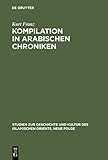Kompilation in arabischen Chroniken : Die Überlieferung vom Aufstand der Zang zwischen Geschichtlichkeit und Intertextualität vom 9. bis ins 15. Jahrhundert / Kurt Franz.
Material type: TextSeries: Studien zur Geschichte und Kultur des islamischen Orients : Beihefte zur Zeitschrift “Der Islam” ; N.F. 15Publisher: Berlin ; Boston : De Gruyter, [2012]Copyright date: ©2004Edition: Reprint 2012Description: 1 online resource (344 p.)Content type:
TextSeries: Studien zur Geschichte und Kultur des islamischen Orients : Beihefte zur Zeitschrift “Der Islam” ; N.F. 15Publisher: Berlin ; Boston : De Gruyter, [2012]Copyright date: ©2004Edition: Reprint 2012Description: 1 online resource (344 p.)Content type: - 9783110182118
- 9783110894998
- 490 22
- DS38.16 .F73 2004eb
- online - DeGruyter
- Issued also in print.
| Item type | Current library | Call number | URL | Status | Notes | Barcode | |
|---|---|---|---|---|---|---|---|
 eBook
eBook
|
Biblioteca "Angelicum" Pont. Univ. S.Tommaso d'Aquino Nuvola online | online - DeGruyter (Browse shelf(Opens below)) | Online access | Not for loan (Accesso limitato) | Accesso per gli utenti autorizzati / Access for authorized users | (dgr)9783110894998 |
Browsing Biblioteca "Angelicum" Pont. Univ. S.Tommaso d'Aquino shelves, Shelving location: Nuvola online Close shelf browser (Hides shelf browser)
Frontmatter -- Vorwort des Herausgebers -- Danksagung -- Inhalt -- Siglen und Zeichen -- Umschrift, Kalender und Belegweise -- Erster Teil. Einleitung -- Zweiter Teil. Quellen und Methode -- Dritter Teil Der Aufstand der Zanǧ im Kompilationsprozess -- Vierter Teil. Ergebnis -- Anhang
restricted access online access with authorization star
http://purl.org/coar/access_right/c_16ec
Die arabische Geschichtsschreibung des Mittelalters ist im wesentlichen Kompilation. Anhand eines repräsentativen Korpus der Berichte vom Aufstand der Zang untersucht Kurt Franz das chronikale Kompilationswesen unter seinen drei Aspekten: Kompilieren (als Vorgang der Stoffauswahl, Anordnung und Textgestaltung), Kompilation (das daraus hervorgehende einzelne Schriftwerk) und Kompilationsprozess (als die Aufeinanderfolge mehrerer Stufen der Überlieferung). Er entwickelt umfassende Kriterien zu deren Beurteilung und schafft mit ihnen die Grundlage dafür, dass die Bedeutung von Autorschaft, Textindividualität und Disziplinarität für die lange vernachlässigte kompilatorische Chronistik erst kenntlich wird. Im Spannungsbogen zwischen historischem Ereigniskern und der intertextuellen Neubestimmung des Überliefernswerten erschließt er der literatur- und geschichtswissenschaftlichen Quellenarbeit ein neues Feld.
Medieval Arab historiography is essentially a matter of compilation. Using the representative corpus of reports on the Zang uprising, Franz examines the compilation of chronicles in its three aspects: compiling (as a process of selecting, ordering and textualising material), compilation (the resultant individual text) and the process of compilations (as the succession of various stages in transmission). He develops comprehensive evaluative criteria and with them creates a basis for clear recognition of the significance of authorship, individuality of texts, and disciplinarity for the long neglected compilatory chronicle tradition. His emphasis on the tension between the kernel of the historic event and the intertextual redefinition of the subsequent records opens up a new perspective for the literary and historical investigation of the primary sources.
Issued also in print.
Mode of access: Internet via World Wide Web.
In German.
Description based on online resource; title from PDF title page (publisher's Web site, viewed 28. Feb 2023)









